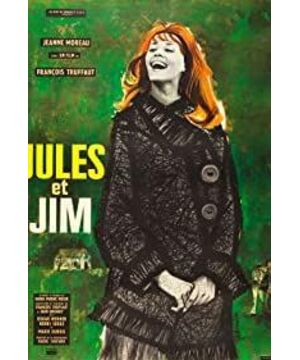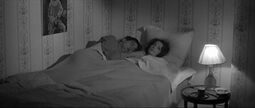The film is different from what I imagined, not the story of Truffaut's time, but Paris on the eve of World War I. However, the film is the same as I imagined, two idealistic young people, passionate and melancholy lovers, travel, laughter, and disillusionment. The most famous scene is when Catherine dresses up as a boy from a Chaplin movie and runs a bet race with Jules and Jim, which Catherine steals and wins. Ever since I knew about this film, I've seen this still photo of three people running and laughing. They are so young, so happy, so harmonious. I was so familiar with this scene that I was a little disappointed when I watched the film. I thought it was longer and the soundtrack was brighter, but in the blink of an eye this shot was over, like our best days were over in the blink of an eye.
Jules and Jim both fall in love with Katherine with her classic smile, but neither wants to ruin their friendship. With Jim's consent, Jules married Catherine, and World War I soon broke out. After the war, Jim went to visit the Jules and his wife in the countryside on the Rhine. With Jules' acquiescence and request, Jim could no longer resist Catherine's charm. The three good friends spent a short and peaceful cohabitation time together. In those days, "life was like a long vacation".
Juul said of Catherine, "She's lost when life is too quiet."
I understand someone like Catherine. Like children, they want every moment to be dazzling, the culmination, and they cannot tolerate mediocrity and stereotypes. Catherine loved Jul and Jim, but she loved the air of freedom and a longing she couldn't even articulate. Real life simply cannot satisfy her surging heart, such a person cannot be possessed by others.
Suddenly I remembered a topic I discussed in high school. At that time, I was young, loved Sartre, and never really participated in life, so everything could be imagined and possible. I have advocated a relationship similar to that of Sartre and Beauvoir. A man and a woman may marry, but they are not bound by a contract. Both parties can have a new love and come and go freely, but they must take care of the other when needed. This kind of relationship is suitable for people who love and know each other well, but have no freshness in the long years.
There was some response to this idea at the time. In fact, today it seems that it is really untenable. Not to mention that the great couple Sartre and Beauvoir have proved the impossibility of this theory by themselves, but I wishful thinking not only freed them from shackles, but also gave them another way of "taking care" of each other. Responsibility is like stepping on one foot on the other. As a result, not only will you not be able to move, but if you struggle, you will fall hard.
And the combination of Jules-Jim-Catherine is actually a similar attempt. This is an innocent and beautiful assumption, premised on their mutual satisfaction and the absence of human jealousy. Being with Jules and Jim day and night doesn't satisfy Katherine, and the seemingly harmonious relationship is even more exhausting, and the trio can only be dismantled. Finally, under Jule's watch, Catherine drove Jim off the broken bridge into the river, a relief. But I don't think it's enough. If I were filming it, I'd have all three of them in the car and fall into the water together, that's the only way they'll be together forever and be happy.
...
Source: http://blog.sina.com.cn/s/blog_4caa6ab301000axy.html
View more about Jules and Jim reviews











